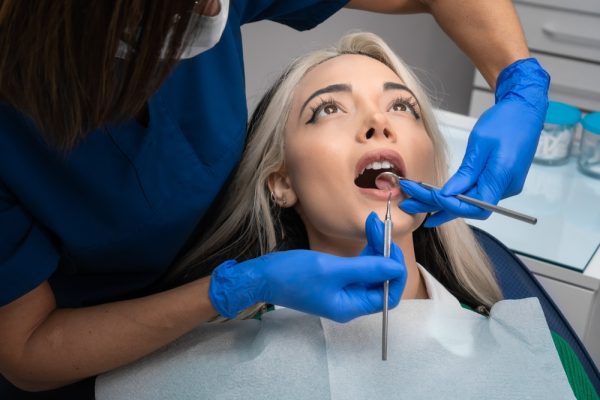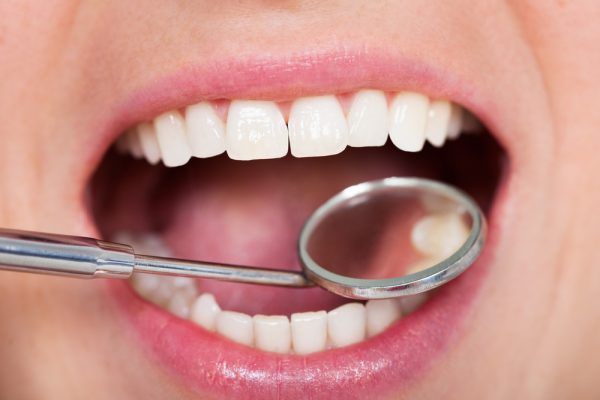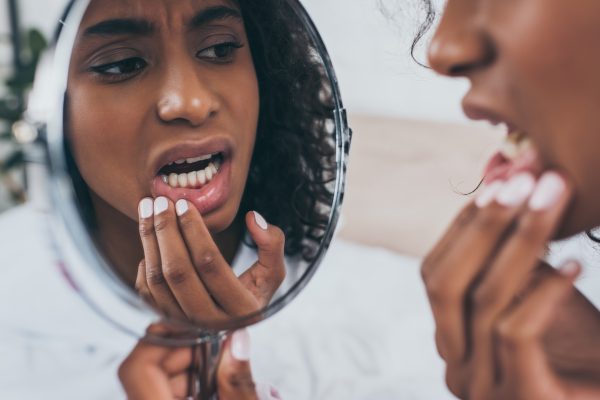Yearly Oral Cancer Screenings Save Lives
Did you know that early detection of oral cancer significantly increases the chances of successful treatment and survival? This fact alone highlights the critical importance of oral cancer screening. If you’re overdue for a dental appointment, contact our Seattle dentist today! At your next dental checkup, we’ll perform an oral cancer screening. Call us today at (206) 682-3888.
Experience top-tier dental care in Seattle, WA, where our skilled team provides personalized treatments for patients from Mercer Island to Belltown to Bellevue and beyond.

The Oral Cancer Screening Process
At Aesthetic Dental Associates, our dentist will perform oral cancer screenings during your biannual dental appointments.
Medical and Dental History
The process often begins with a review of the patient’s medical and dental history. This includes discussing any risk factors such as tobacco and alcohol use, family history of cancer, and any previous oral health issues.
Visual Inspection
During a visual inspection, our Seattle dental professionals examine the entire mouth, face, neck, and throat for asymmetries, swelling, bumps, patches of color, or other abnormalities. We’ll use a light, mirror, and tongue depressor to identify potential signs of oral cancer.
For instance, the tongue is carefully examined for:
- Ulcerations
- Swelling
- Discolorations
- Irregularities
- Restrictions in movement
The lips are also closely inspected for any discrepancies in symmetry, contour, color, or texture, particularly focusing on the vermilion border of the lower lip, a common site for oral cancers.
Physical Examination
A physical examination of the head, neck, and oral cavity is conducted to assess for any enlarged lymph nodes, masses, or other abnormalities in the surrounding tissues.
Tongue, Palate, and Throat Examination
Our dentist will examine the top, sides, and underside of the tongue, looking for any changes in color, texture, or the presence of lesions.
The roof of the mouth (palate) and the back of the throat are also examined for any unusual growths, discolorations, or other irregularities.
Oral Cancer Screening Devices
In some cases, our dentists may use special screening devices or technologies to aid in the detection of oral cancer. These may include:
- VELscope: A handheld device that uses fluorescent light to highlight abnormal tissues in the mouth.
- TBlue: A rinse that can help visualize suspicious lesions.
Tissue biopsies may be taken if any suspicious lesions or abnormalities are found.
Patient Education
During the screening, our downtown Seattle dentist and dental team may educate the patient about the risk factors associated with oral cancer and guide lifestyle changes to reduce those risks.
Follow-Up
If any suspicious lesions or abnormalities are detected, the patient may be scheduled for further evaluation, which may include a biopsy of the abnormal tissue to confirm the presence of cancer. Early detection is critical for successful treatment.
Routine Screening
Regular oral cancer screenings are recommended, especially for individuals with risk factors, such as tobacco and alcohol use. The frequency of screenings may vary based on individual risk factors and medical history.

How to Conduct a Self-Oral Cancer Screening
Performing a self-oral cancer exam at home can help you become more aware of any potential changes or abnormalities in your mouth. While self-exams aren’t a substitute for professional screenings by a healthcare provider, they can be a useful tool for early detection.
Here’s how to check for oral cancer symptoms yourself:
- Find a Well-Lit Area: Choose a well-lit room with natural light or good artificial lighting to ensure you can see clearly.
- Use a Mirror: You’ll need a handheld mirror and a larger mirror mounted on a wall or placed on a stable surface. The larger mirror will help you see the back of your mouth and throat.
- Wash Your Hands: Always start by washing your hands thoroughly to minimize the risk of introducing any germs or infections into your mouth during the examination.
- Check Your Lips and Face: Begin by looking at your face and lips in the mirror. Look for any changes in color, texture, or sores that don’t heal.
- Examine the Outer Oral Cavity: Use the handheld mirror to examine the outside of your mouth. Check for any abnormalities on your cheeks, the corners of your mouth, and the sides of your tongue.
- Check the Inner Oral Cavity: Use the handheld mirror to examine the inside of your mouth. This includes:
- The roof of your mouth (palate)
- The underside of your tongue
- The inside of your cheeks
- Your gums
- Examine Your Tongue: Stick out your tongue and use the handheld mirror to examine its top, sides, and underneath. Look for any unusual bumps, lumps, or changes in color.
- Inspect the Throat and Tonsils: Tilt your head back and use the larger mirror to examine the back of your throat and tonsils. Look for any swelling, red or white patches, or unusual growths.
- Feel for Lumps and Bumps: Gently use your fingers to feel for any lumps or bumps in your neck, especially in the area of the lymph nodes.
- Repeat Regularly: Self-exams should be performed regularly, ideally once a month, to monitor for any changes over time.
- Note Any Changes: If you notice any persistent changes, such as new sores that don’t heal, unexplained lumps, or unusual growths, contact our dentist or healthcare provider for a professional evaluation.

Frequently Asked Questions
Oral cancer screenings are quick and painless, taking less than five minutes. They can be done at every dental hygiene appointment and are recommended every three years for adults over the age of 20, and annually for those over 40. Early detection increases the chances of successful treatment.
In general, it’s recommended to have a screening as part of your regular dental check-up, which is typically every six months. However, individuals with higher risk factors, such as a history of tobacco or alcohol use or a family history of oral cancer, may need more frequent screenings.
Take Charge of Your Oral Health!
Through a combination of visual and physical examination, as well as advanced screening techniques, our Seattle dentist can identify abnormalities that may indicate oral cancer. Schedule an appointment today by giving us a call at (206) 682-3888.
Our Seattle dental practice is the go-to choice for residents of Queen Anne, West Seattle, and North Beacon Hill, offering exceptional care in a friendly and modern setting.

